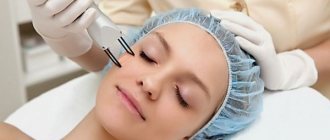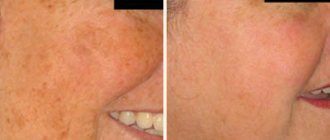04/24/2019 Fraxel is a non-invasive laser procedure that renews the skin, restores youth, freshness and health to it, eliminates pigmentation, evens out the texture and color of the skin, making the skin denser and more elastic.
The Fraxel procedure was developed in the USA and tested in cosmetology 13 years ago. Today, such rejuvenation is carried out in more than 70 countries. The technique provides amazing results with minimal risk of complications.
Lilalic Center is the official partner of Fraxel. We use their original FRAXEL RE:STORE DUAL.
FRAXEL RE:STORE DUAL is the most advanced of the Fraxel lasers. This device can generate two types of radiation at once:
- with a wavelength of 1550 nm (erbium) – for the correction of deep and fine wrinkles, narrowing of pores, treatment of scars (keloid and acne scars)
- with a wavelength of 1927 nm (thulium) - for deep and superficial effects, treatment of pigmentation, rejuvenation and improvement of skin quality.
How it works
The laser operates on the basis of fractional photothermolysis, i.e. tissue destruction due to exposure to high temperatures. It turns out that this is a technology for targeted destruction of tissue using a laser on individual areas of the skin, which directs energy to the desired area of the skin in the form of a beam of many microscopic rays of light.
Fraxel laser rejuvenation causes tissue self-healing after such targeted damage, and as a result, increased production of elastin, collagen and hyaluronic acid begins in the skin.
During the laser rejuvenation process, the laser beam is fractionated (i.e. divided) into hundreds of the finest rays, and the cosmetologist can accurately calculate and set the depth and intensity of their impact, based on the individual characteristics of the patient and indications.
The result of a course of 3-5 Fraxel procedures is young and elastic skin that is even in color. Since Fraxel is a procedure that actually stimulates the formation of new, blemish-free skin, the rejuvenation results from a course of Fraxel treatments last for many years, and the results from Fraxel's effects on scars and stretch marks last forever.
Fraxel does not radically change the appearance and does not make the face unnatural; the main result of Fraxel rejuvenation is the return of the skin to the state it was in 5-10 years ago. Among all hardware rejuvenation procedures, this is truly one of the highest rates.
Indications
The Fraxel laser has 8 FDA approvals and is used for fractional resurfacing. Main indications for the Fraxel procedure:
- Fine and mesh wrinkles;
- Large wrinkles (in combination with contouring);
- Expression wrinkles (in combination with botulinum therapy);
- Signs of chrono- and photoaging;
- Scars - of any etiology and type with the exception of keloids;
- Skin stretch marks;
- Enlarged pores;
- Age spots (sun spots, age spots);
- Melasma;
- Uneven skin color and texture.
How does the procedure work?
Before the procedure, the skin is cleaned and an anesthetic cream is applied for 60 minutes. During the procedure, the doctor passes the device’s nozzle over the patient’s skin several times in different directions; his movements are similar to an artist’s brush painting a canvas. This technique, which differs from the common stamp technique, ensures an optimal therapeutic effect in the affected area, maximum uniformity of exposure and safety. Finally, a soothing cream is applied to the skin.
Duration of the procedure : about 30 minutes with preliminary application of anesthesia in the form of a cream (one hour before the procedure).
Duration of the course: up to 3 procedures - for complete removal of age spots, 1-2 procedures per year - to maintain a rejuvenating effect and a longer course - to treat scar changes.
Rehabilitation: 2-3 days, the very next day after the procedure it is possible to use decorative cosmetics.
Business
Fraxel is a branded, high-profit procedure whose demand and price have remained high for several years now. The versatility of Fraxel allows us to offer this procedure to any client. In addition to the profit from the use of Fraxel, the beauty industry receives significant benefits from the sale of other procedures for which Fraxel is a kind of core. Fraxel attracts additional clients to the clinic or beauty salon who are looking for Fraxel on the website www.fraxel.ru. Contact us and our managers will help you calculate the payback period for Fraxel at your enterprise.
Care instructions
After the procedure, it is important to take care of the skin, since it undergoes intensive recovery processes; doctors often use professional cosmetics based on biologically active substances that enhance the effect of the procedure.
It is necessary to moisturize the skin for at least 2 weeks after the procedure. Also, to avoid hyperpigmentation, it is necessary to protect the skin from UV for at least one month using creams with SPF 50.
A unique feature of Fraxel is also that this laser does not destroy the uppermost layer of the epidermis - the stratum corneum. Therefore, the Fraxel procedure does not violate the barrier functions of the skin, after it there is no need to apply protective bandages, use special products, you do not need to sit at home for weeks and wait for the skin to recover, as sometimes happens after procedures with other lasers.
All existing Fraxel models:
There are several devices under the Fraxel brand; in Russia, the most common lasers are Fraxel re:store and Fraxel re:store DUAL.
Fraxel SR 750, the first commercially available fractional laser, entered the US market in 2004 and was produced until 2007. The optical tracking system required the use of special marker paint on the skin, which caused some inconvenience during the procedure. 1550 nm, maximum energy 40 mJ.
Fraxel SR 1500 - replaced the SR 750 in 2007, it had a completely redesigned system for distributing MLZ over the skin surface and a laser energy control system, new roller tips appeared, and there was no need for marker paint. 1550 nm, maximum energy 70 mJ.
Fraxel re:store - appeared in 2009 almost simultaneously with the Fraxel re:store DUAL laser. The new re:store platform allows the procedure to be performed 25% faster, and a built-in cold air exhaust system has appeared in the laser handle. 1550 nm, maximum energy 70 mJ.
Fraxel re:store DUAL is one of the most popular Fraxel laser models. This device can alternately operate at wavelengths of 1550 nm and 1927 nm. The laser was created on the “high-speed” re:store platform and is the most multifunctional of all Fraxel non-ablative lasers. 1550 nm, maximum energy 70 mJ. 1927 nm, maximum energy 20 mJ.
Fraxel re:fine is the “little” brother of Fraxel re:store, a device that was specially designed for rejuvenation and prevention of aging. The wavelength of 1440 nm, which is used in it, allows you to perform procedures more comfortably and with a shorter rehabilitation period. 1440 nm, maximum energy 20 mJ.
Fraxel re:pair is Fraxel's only ablative fractional laser. Used with two interchangeable fractional handles – 135 µm – for deep fractional ablation and 600 µm – for superficial. Can be equipped with handles for excision and ablation of soft tissues (surgical operations). This device has analogues: lasers such as Ultrapulse and Acupulse.
Advantages over other methods
The Fraxel procedure has a number of unique benefits that have made it extremely popular throughout the world.
- Due to the fractional principle of exposure, the Fraxel procedure is much safer and much less traumatic than common procedures of chemical peels, laser resurfacing, and dermabrasion.
- In terms of effectiveness, Fraxel is equal to most aggressive and inconvenient procedures in terms of rehabilitation. For a number of indications (for example, scars and stretch marks), Fraxel is more effective than the most traumatic techniques.
- The rejuvenation effect of the Fraxel procedure lasts for several years (3-5) depending on age and lifestyle
- Recovery after the Fraxel procedure takes from 1 to 3 days, and during this time there is no need to stay at home.
- Side effects from the Fraxel procedure are only redness and swelling in the treated area (similar to a sunburn), these effects go away on their own within 1-3 days.
- Immediately after the procedure, as well as during the entire recovery period, makeup can be applied to the skin to mask redness. Most patients look the next day in such a way that no one will understand that they had a fairly serious procedure.
- The Fraxel procedure can be performed on any area of the face and body with any skin color.
- The Fraxel procedure can be done at any time of the year, including summer.
- The Fraxel laser is designed in such a way that a specialist can easily select the most optimal parameters for each patient, not only depending on the indications and structural features of the skin, but also taking into account the patient’s wishes for effectiveness.
- The Fraxel procedure has a minimum of contraindications, and unlike many invasive procedures, it can be performed on the same day of treatment.
Fraxel re:store Dual fractional laser rejuvenation
Fraxel Re:store Dual Fractional photothermolysis
The Fraxel procedure is the No. 1 laser procedure in the world, due to its effectiveness, short and predictable rehabilitation, minimal risk of complications, and can be performed on any area of the face and body.
In 2013, the Fraxel laser received approval from the most stringent US certification organization, the FDA (Food and Drug Administration).
This approval fully confirms the safety and effectiveness of the Fraxel laser for:
- elimination of wrinkles in the periorbital area
- eliminating acne marks and surgical scars
- hyperpigmentation treatment
- eliminate melasma
- epidermal renewal
- combat actinic keratosis (skin disease caused by sun exposure)
The non-ablative fractional laser Fraxel Re:store Dual combines two laser technologies: the classic 1550 nm erbium (Er:fiber) laser for deep dermal remodeling and the latest 1927 nm thulium (Tm:fiber) laser for epidermal renewal.
The Fraxel laser rejuvenation procedure is a fully controlled method of safe treatment of the skin, thanks to which the following tasks are solved:
- skin rejuvenation is performed
- improves complexion
- skin structure thickens
- wrinkles are smoothed out
- enlarged pores narrow
- pigmentation is removed
- scars, scars, stretch marks, post-acne are eliminated
The Fraxel system is a laser brand leading the world in non-ablative fractional photothermolysis.
This is facilitated by the following features of Fraxel laser rejuvenation:
- high efficiency of procedures
- short, predictable rehabilitation period
- low risk of possible complications
- Can be used for any skin type
- Possibility of performing procedures on any area of the skin
Efficiency and safety of Fraxel fractional laser rejuvenation
Laser therapy and treatment using Fraxel technology are completely safe. The nature of the action of the technique and the comfort of its use allow us to consider Fraxel a “weekend procedure.”
Photothermolysis allows you to influence the skin at the epidermal level. The laser beam forms microthermal treatment zones on the skin in which coagulation occurs. Heat shock promotes intensive cell renewal.
Ablation destroys cells, creating micro-wells in the dermis in which new cells are produced. Depending on the purpose, there are three types of ablation:
- superficial - for the treatment of pigmentary malformations
- medium – to eliminate vascular pathology
- deep – for correction of wrinkles, scars
Fraxel fractional laser rejuvenation procedure
The results of a photothermolysis course last for years. Scars and stretch marks are removed permanently. Unlike contouring and botulinum toxin injections, with laser correction there are no dramatic changes in appearance: the skin simply returns to the state it was 5 – 10 years ago.
Protocol for the Fraxel photothermolysis procedure:
- Skin is cleared of cosmetics
- 40 – 60 minutes before the start of treatment, topical anesthesia is applied
- Before the procedure begins, the application anesthesia is removed and the skin is covered with a lubricant to ensure the laser tip glides
- The laser handle is passed over the skin in various directions within the treatment area. Unlike the stamp technique, laser impact is uniform and safe
- At the end of the procedure, the lubricant is removed and a special soothing cream is applied to the skin.
During the rehabilitation period, intensive restoration processes occur in the skin. Regular moisturizing must be used for at least two weeks after the procedure. Also, to avoid unwanted pigmentation, it is necessary to protect the skin from exposure to ultraviolet rays.
Frequently asked questions from patients wishing to undergo laser rejuvenation with the Fraxel device:
1. Are there any contraindications for Fraxel laser treatment?
Yes, these are classic contraindications for any laser procedures: epilepsy, pregnancy, inflammatory and oncological processes in the area of intended treatment, chemical peeling and similar procedures performed less than 2 weeks before treatment, psoriasis, atopic dermatitis in the acute stage. You should tell your doctor if you have an allergic reaction to lidocaine.
2. How should I prepare for the Fraxel procedure? How long before the procedure can I drink alcohol, go to the sauna, or engage in intense sports?
No special preparation is needed for the Fraxel procedure (Fraxel re:store and Fraxel re:store DUAL). You can exercise and go to the sauna in the morning before the procedure. Alcohol can be consumed in moderation even before the procedure.
3. Are any tests necessary before the Fraxel procedure?
You do not need to take any tests before the Fraxel procedure.
4. How long does one procedure take?
The procedure time depends on the area of the treated areas. For example, facial treatment takes 20-30 minutes, eyelid treatment – 5-10 minutes. Anesthetic cream is applied to the skin 40-60 minutes before the procedure.
5. How many procedures need to be done? Is there any result from one procedure?
The number of procedures depends mainly on the problem the patient is presenting with, the degree of its severity, as well as the aggressiveness of the procedure. Typically, this course of Fraxel re:store laser procedures consists of 3-5 sessions, carried out at intervals of 2 weeks to 2 months. There is a result from one procedure, but in order to achieve maximum effect, it is better to take a course of several procedures. When using the Fraxel re:store DUAL laser, the number of necessary procedures to remove age spots can be reduced to 1-2.
6. What areas can be treated with the Fraxel laser?
The Fraxel procedure can be performed on any area of the face and body, including delicate areas: eyelids (up to the eyelash edge), neck and décolleté.
7. How do you feel during the procedure?
During the procedure, you will feel warmth and moderate discomfort in the area where the doctor will touch the handle of the device. Since to ensure high efficiency, the Fraxel laser needs to penetrate the reticular layer of the dermis, where there are many pain receptors, it is unfortunately impossible to completely get rid of the feeling of warmth and moderate burning. The Fraxel procedure is performed using a superficial numbing cream that reduces discomfort. Also, during the procedure, cool air is blown onto the skin to increase comfort.
8. What will my face look like immediately after the procedure and the day after?
Immediately after the procedure, the face will be moderately red and minor swelling will be visible. It's like you've been over tanning in the sun. The next day the swelling will subside; redness may persist for 2 to 3 days. The skin's reaction to the procedure depends on individual characteristics, as well as on the intensity of treatment. If you want to hide the fact of the procedure from others, you can use foundation cosmetics.
9. What should you do after the procedure?
No special medical skin care is needed after the Fraxel procedure. In order for the redness to go away faster, the doctor may prescribe you cosmetics and topical medications that speed up the recovery process. You can use the Regenerative restoring cream from the SYSTEM nanogreen PROFI line, which is specially designed for use together with Fraxel. Within a month from the date of the procedure, it is necessary to protect the skin from ultraviolet rays - when going outside, use sunscreen SPF30 or higher.
10. What should not be done after the procedure?
Do not immediately after the procedure apply substances that have an irritating effect (for example, alcohol-containing lotions) to the treated area. For at least two weeks after the Fraxel procedure performed with the Fraxel re:store and Fraxel re:store DUAL lasers, you should refrain from any procedures that injure the skin (for example, peelings and dermabrasion)
11. Is there a danger of getting infected with something during the procedure?
There is no danger of infection during the Fraxel procedure if the doctor acts correctly. All Fraxel lasers are equipped with special replaceable tips (nozzles), which are thoroughly disinfected by medical staff after the procedure.
12. What complications occur after Fraxel procedures?
According to a study by Emmy M. Grabber et al., the following complications are possible after the Fraxel procedure: acne (acne) - 1.87 percent, facial herpes - 1.77 percent, post-inflammatory hyperpigmentation - 0.73 percent, prolonged (more than 4 - days) erythema - 0.83 percent and prolonged (more than 2 days) swelling - 0.62 percent. All these complications are possible with a correctly performed procedure, and all of them are successfully resolved within a month. It should be emphasized that the exact same complications occur with classical laser resurfacing (CO2 and erbium) tens of times more often. People often ask about other complications, but we can confidently say that with the Fraxel procedure performed correctly and following the doctor’s recommendations, there is no risk of scars, cancer, or keloid growth at the site of a regular scar.
(Research “Side effects and complications of fractional laser photothermolysis: Experience with 961 treatments” 2008)
13. At what age can Fraxel procedures be performed?
The Fraxel procedure can be performed at any age. It all depends on what you want to treat. Typically, anti-aging procedures are not performed before the age of 25. Pigmentation, post-acne, and stretch marks are treated already at the age of 14-16, and it makes no sense to treat stretch marks during the period of active growth and hormonal changes. Fraxel's youngest patients are typically children aged 5-7 years who are being treated for traumatic or surgical scars.
14. Can the Fraxel procedure be performed in spring and summer?
The Fraxel procedure can be performed at any time of the year, including spring and summer. But it must be remembered that melanogenesis in general and the appearance of pigmentation in particular are processes that are associated with the effect of ultraviolet radiation on the skin. It doesn't matter what time of year you do Fraxel - you should protect your skin from sun rays for at least a month after the procedure. This doesn’t mean you have to stay at home, you just don’t need to sunbathe, and when going outside, be sure to use sunscreen.
For reference: in California, the Fraxel procedure is performed all year round, and most of the year in this region of the United States is much sunnier than June and July in Moscow.
15. Why is anesthesia needed before the Fraxel procedure?
Fraxel penetrates deeply - up to 1.4 mm. On the scale of the skin, this is the deep reticular dermis. When forming microzones of influence, Fraxel can affect pain receptors that are located in the reticular layer of the dermis (there are more than 2000 of them per square centimeter). Unfortunately, it is impossible to destroy the skin at such a depth (and this is important if it is necessary to smooth out wrinkles) without pain. That’s why superficial anesthesia is used: it allows you to endure such a deep effect relatively comfortably.
16. Is it possible to use Fraxel to get rid of enlarged pores, even out complexion and remove acne?
Fraxel re:store (classic Fraxel) is used to reduce pores and treat post-acne. In the USA, the gold standard for post-acne treatment is the Fraxel re:store procedure.
To smooth out acne and reduce pores, 5 Fraxel re:store procedures are usually sufficient. The number of procedures depends on the age of the post-acne scars, your age, and the size of the scars. Detailed information can be obtained at a free consultation.
The Fraxel procedure does not specifically address acne or skin texture. This is fractional skin remodeling, the result of which is the smoothing of the surface (relief) and color of the skin, as well as its rejuvenation.
17. Can Fraxel help get rid of dark circles under the eyes?
Dark circles under the eyes are a phenomenon usually associated with stagnation of blood in the vessels. The skin on the eyelids and under the eyes is very thin, and oxygen-poor blood can show through, giving the skin a bluish tint. In addition, the area under the eyes may have more pigment at the epidermal level, which gives it a brown tint.
Fraxel tightens the skin and makes it healthier by stimulating blood circulation and also removes excess pigment. Therefore, Fraxel treatment under the eyes is quite effective in removing dark circles.
We recommend that you consult with your doctor, as dark circles can be either a normal physiological feature or a sign of a chronic disease.
18. Can Fraxel treatments be used to remove stretch marks on the breasts, particularly after breast augmentation?
It is absolutely safe to use this laser on any area of the body, including the breast area (including after mammoplasty). It's best to treat stretch marks as soon as they form, but it's important to prevent new ones from appearing. If you are planning further surgeries that increase volume, it is important for you to understand that new stretch marks may appear.
19. How harmful is laser radiation to the body during the Fraxel procedure?
Laser radiation from an erbium fiber optic laser (Fraxel re:store) is absolutely safe for the body. All Fraxel lasers belong to the class of infrared lasers. Infrared radiation itself is very common in the world around us. For example, about 48% of sunlight is infrared light. The dose of infrared light irradiation from the Fraxel procedure is hundreds of times less than from the emitters around you every day (for example, a radiator), moreover, infrared radiation can cause only one effect in the skin - heating. In the case of the Fraxel laser, this heating is strictly controlled, and it is the essence of the procedure.
20. What is the fundamental difference in the effects of phototherapy and Fraxel?
The fundamental difference between Fraxel and photorejuvenation is that Fraxel forms micro-zones of influence in the skin by heating water, while photorejuvenation (IPL) heats pigments in the skin (melanin primarily). Therefore, in the case of photorejuvenation, treatment is effective mainly for surface pigment and on light skin, and in the case of Fraxel, pigment of any depth is removed and on skin of any color type.
21. How harmful are the effects on vision from Fraxel eyelid procedures?
Absolutely harmless if the procedure is carried out correctly. Fraxel is the only fractional laser that is FDA approved for eyelid procedures. Special narrow tips are used that allow the doctor to work right up to the eyelash edge. At the same time, due to the fact that the skin in the upper eyelid area is very thin, special parameters of the Fraxel re:store procedure are used.
22. How long after the filler injection can I undergo the Fraxel procedure if the instructions for the filler indicate not to use it in conjunction with laser therapy?
Fraxel procedures can begin 2-4 weeks after the injection of fillers. But we must take into account the fact that any laser procedure is thermal and can accelerate the biodegradation of fillers. Alternatively, during the procedure you can avoid touching the skin areas above the installed fillers.
23. Can Fraxel help get rid of fine lines and crow's feet around the eyes?
For facial wrinkles, injections of botulinum toxin preparations (for example, Botox or Dysport) are used. They work well with Fraxel treatments. Botox does not affect the surface of the skin, it simply relaxes the facial muscles, so it is better to do it together with Fraxel Botox to smooth out the skin texture where grooves have already formed.
24. Can the Fraxel procedure be performed if spider veins are visible on the face and nose?
Vascular tissue and other vascular disorders (for example, rosacea) are not a contraindication to the use of Fraxel. Please note that the Fraxel procedure is aimed at rejuvenation, evening out the relief and color of the skin, but it does not affect deep enough vessels. If you want to get rid of spider veins, we recommend undergoing the IPL procedure (for example, using the Quantum device).
25. Why should you not be in the sun for 3 months after the Fraxel procedure and what could be the consequences after exposure to sunlight?
Fraxel, like a number of other cosmetic procedures, enhances metabolic processes in the skin. If, after the Fraxel procedure, the skin is exposed to ultraviolet rays (sunlight or solarium), there is a risk of causing the appearance of age spots (hyperpigmentation).
Therefore, the Fraxel procedure can be done if you do not plan to sunbathe for 1-3 months after the procedure. This period will be determined more precisely by your attending physician, since the risk of developing hyperpigmentation also depends on your individual characteristics. If you plan to travel to sunny countries after the Fraxel procedure, do not forget about sunscreen (SPF30 or higher).
26. How long does the effect last after 4-5 Fraxel treatments? How soon can it be repeated?
It is impossible to accurately calculate how long the effect of Fraxel treatment will last, but it will last longer than a month or a year. Fraxel restores youth to your skin, but it does not “freeze” it and does not affect the rate of its aging. After 4-5 treatments, the quality of your skin will change - it will look younger, but after that the skin will continue to age the same way as before. Those. the effect will not last for 10 years. The rate of skin aging will depend on many factors: your lifestyle, genetics, hormonal status, bad habits, etc. If you lead a healthy lifestyle and take care of your skin, the effect will last longer. If it’s the other way around, the skin will age earlier than before Fraxel.
We recommend that all patients, after a course of 4-5 procedures, undergo one maintenance procedure once a year.
Sign up for a free consultation with a cosmetologist
You can call us
by phone: +7 (495) 6780558
We are always glad to see you!
Scientific background
The technique that revolutionized the world of laser cosmetology
Fraxel works on the principle of non-ablative fractional photothermolysis, which consists of the formation of microscopic zones of thermal damage (micro-therapeutic zones, MZ), which are surrounded by intact skin. This approach allows you to destroy old and damaged skin to a greater depth, while requiring short rehabilitation and safer than traditional laser techniques. The effectiveness and safety of fractional photothermolysis depends on the depth of exposure and the percentage of skin destroyed (percentage of coverage).
The uniqueness of Fraxel lies in the fact that MLZ can be formed superficially, at the level of the epidermis, and deeply (up to 1.4 mm), at the level of the dermis, precisely adjusting this depth. At the same time, you can adjust the percentage of coverage from 5% to 70% and work at any percentage of coverage without the risk of burns and scarring.
Fraxel micro-zone of influence
How long does the result last?
Much of the results of fractional laser therapy are permanent, such as the reduction in the appearance of acne scars, the disappearance of age spots and unwanted pigmentation. The rejuvenation effect also often lasts for a long period - it will gradually disappear as the skin naturally ages.
The duration of the effect of the procedure is also affected by your lifestyle, skin care and age. It is very important to carefully care for your skin after therapy - try to protect it from destructive external influences for as long as possible. We recommend using sunscreen daily to protect your skin from pigmentation and age spots caused by UV rays. A healthy lifestyle can help prevent signs of aging and improve the body's ability to repair damage to the skin. If you are using Fraxel for rejuvenation, you will need special care after the procedure to maintain the appearance of your skin.
Specifications
| Characteristic | Meaning | A comment |
| Wavelength and laser type | Erbium fiber optic 1550 nm | For deep non-ablative fractional photothermolysis |
| Thulium fiber optic 1927 nm | For surface non-ablative fractional photothermolysis | |
| Energy | 4-70 mJ for 1550 nm 5-20 mJ for 1927 nm | Determines the depth of impact |
| Depth of influence | 200 µm to 1390 µm (0.2 to 1.4 mm) | Histologically confirmed photothermolysis depth |
| Coverage percentage | 5-48% for 1550 nm 20-70% for 1927 nm | Determines the aggressiveness of the impact |
| Beam diameter | From 120 to 300 µm | Adjustable by beam diameter optimization system |
| Pulse duration | From 166 to 2900 µs | Provides minimal thermal damage around the MLZ |
| Cooling | Not required | For comfort of the procedure, cold air can be used (Cryo Mini, Cryo 6) |
| Method of distribution of microzones of influence | Distribution of MLZ “on the move” IOTS system. | For uniform distribution of MLZ over any area |
| MLZ formation rate | Up to 3000 MLZ per second | Provides record-breaking speed of procedures |
| Availability of eyelid tips | Yes, 5mm tip | For treating eyelids up to the lash line |
Photona or Fraxel: which is better?
Photon laser is a device that affects the skin in 4 stages, affecting the inner and outer surface of the skin. It is also worth noting that this type of laser can also affect the oral mucosa. The effect of both Photona and Fraxel is similar. However, photona can remove a double chin, remove puffiness and dark circles under the eyes, and eliminate gray skin.
However, a significant advantage of Fraxel is that it has significantly fewer contraindications, its procedures are not as painful, and the rehabilitation period is shorter.
Therefore, it is difficult to say which of the two devices is better. On the one hand, there are a larger number of procedures, and on the other, painlessness and quick recovery. Therefore, the choice of device is absolutely individual for everyone.









